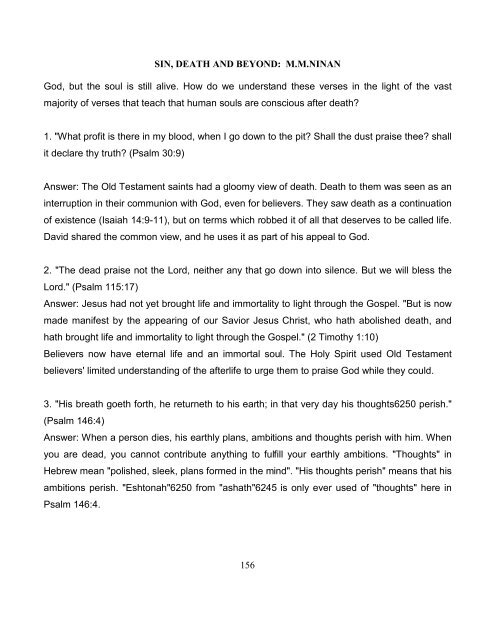Sin death and beyond
Create successful ePaper yourself
Turn your PDF publications into a flip-book with our unique Google optimized e-Paper software.
SIN, DEATH AND BEYOND: M.M.NINAN<br />
God, but the soul is still alive. How do we underst<strong>and</strong> these verses in the light of the vast<br />
majority of verses that teach that human souls are conscious after <strong>death</strong>?<br />
1. "What profit is there in my blood, when I go down to the pit? Shall the dust praise thee? shall<br />
it declare thy truth? (Psalm 30:9)<br />
Answer: The Old Testament saints had a gloomy view of <strong>death</strong>. Death to them was seen as an<br />
interruption in their communion with God, even for believers. They saw <strong>death</strong> as a continuation<br />
of existence (Isaiah 14:9-11), but on terms which robbed it of all that deserves to be called life.<br />
David shared the common view, <strong>and</strong> he uses it as part of his appeal to God.<br />
2. "The dead praise not the Lord, neither any that go down into silence. But we will bless the<br />
Lord." (Psalm 115:17)<br />
Answer: Jesus had not yet brought life <strong>and</strong> immortality to light through the Gospel. "But is now<br />
made manifest by the appearing of our Savior Jesus Christ, who hath abolished <strong>death</strong>, <strong>and</strong><br />
hath brought life <strong>and</strong> immortality to light through the Gospel." (2 Timothy 1:10)<br />
Believers now have eternal life <strong>and</strong> an immortal soul. The Holy Spirit used Old Testament<br />
believers' limited underst<strong>and</strong>ing of the afterlife to urge them to praise God while they could.<br />
3. "His breath goeth forth, he returneth to his earth; in that very day his thoughts6250 perish."<br />
(Psalm 146:4)<br />
Answer: When a person dies, his earthly plans, ambitions <strong>and</strong> thoughts perish with him. When<br />
you are dead, you cannot contribute anything to fulfill your earthly ambitions. "Thoughts" in<br />
Hebrew mean "polished, sleek, plans formed in the mind". "His thoughts perish" means that his<br />
ambitions perish. "Eshtonah"6250 from "ashath"6245 is only ever used of "thoughts" here in<br />
Psalm 146:4.<br />
156


















